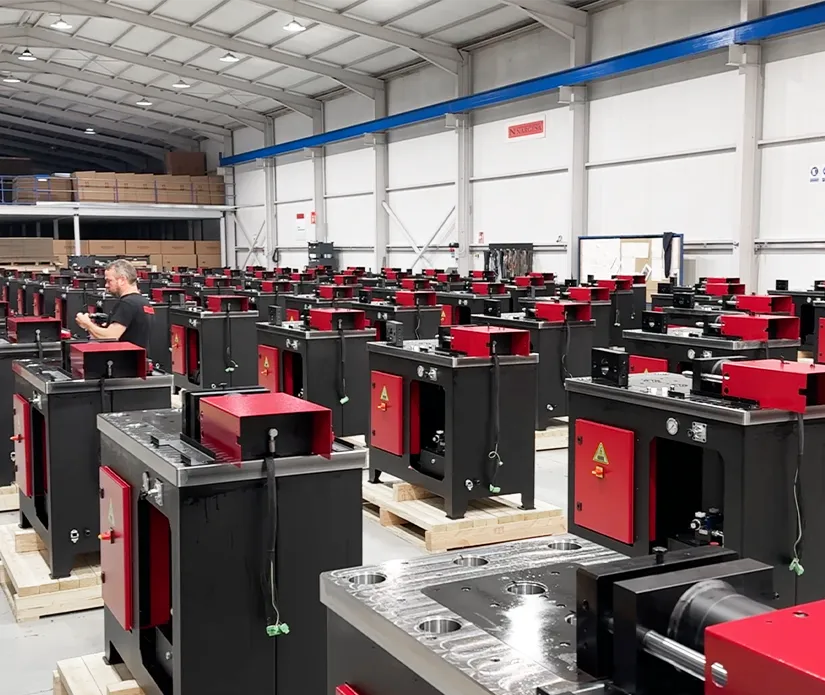What is industrial machinery, types and what is it used for

Industrial machinery is fundamental in various productive sectors. In this article, we will explain what industrial machinery is, what it is used for, the different types available, and the sectors most interested in the type of industrial machinery that we manufacture at Nargesa:
What is industrial machinery
Industrial machinery encompasses a wide range of equipment designed to perform specific tasks within production processes. These machines are essential for mass manufacturing, enabling fast, efficient, and consistent production of high-quality products. From simple tools to complex automated systems, industrial machinery integrates various advanced technologies to optimize production.
Types of Nargesa industrial machinery
Nargesa industrial machinery offers a variety of industrial machinery, including:
- Tube and pipe benders: Such as the MC150B pipe and tube bender, the MC200 tube and profile bender, the MC400, MC200H, MC550, MC650. These bender machines are ideal for manufacturing flanges, greenhouses, railings, and large structures for construction.
- Ironworker machines: Such as the MX700 ironworker machine and the MX340G, capable of performing multiple operations such as cutting, bending, and stamping.
- Non-mandrel tube and pipe benders: Such as the CC60 CNC non-mandrel tuve and pipe bender and the CC90 CNC, which perform bends in hollow tubes up to 180º with the best finish, maximum speed, and less thickness than other machines in their category.
- Power Hammers for Forging: Like the Nargesa PH50 Hammer, with a nominal stroke weight of 50 kg or 110 lbs.
- Twisting and scroll bending machines: Equipment such as the MT150A and MT500A models, which allow for the production of ornamental pieces.
- Horizontal press brakes: Such as the PP200 CNC models and the new automatic stop for the PP200CNC, which allow you to perform operations such as bending, folding, curving, cutting, and more.
- End wrought iron machines: Including the NF70 End Wrought Iron Machine and the PC16, which allow the rolling of bar ends and the PH50 power hammer, which allows the manufacture of all kinds of ornamental forging pieces.
- Gas forges: Such as the H1, H2, and H3 models of Gas Forges, which are used to heat iron and work it.
- Hydraulic shears machines: Such as the C3006CNC and the C2006CNC Shears, designed for precise and efficient cuts.
- Hydraulic press brakes: Including the MP1500CNC and MP3003CNC models, which offer excellent levels of precision and efficiency in the sheet metal bending process.
- Broaching machines: Such as the BM25 vertical Broaching Machine, designed to make keyways in metal parts.
- Press for loks machines: Models like the PI85 offer the fastest and most precise solution for drilling the box, handle, and cylinder in a hollow tube.
- Iron Embossing Machines: Like the NOA60 Iron Embossing Machine, for molding iron in cold conditions, stamping designs on flat bars, etc.
What is industrial machinery used for
Industrial machinery is used to improve efficiency and productivity in manufacturing and production, allowing for the mass production of goods with greater precision and consistency. It also reduces operational costs and manual effort, ensuring quality and optimizing resource use in various industrial sectors. Below, we explain this in more detail:
- Process automation Industrial machinery automates repetitive and complex tasks, reducing human intervention and minimizing errors. This aspect is crucial in industries such as automotive and electronics, where precision is vital. Automation allows for a constant and efficient production flow, improving consistency and reducing downtime.
- Increased productivity It significantly increases production in less time, reducing operational costs and increasing market competitiveness. This is essential in high-demand sectors such as mass consumer goods manufacturing, where speed and efficiency are key to meeting market needs.
- Quality improvement Industrial machines ensure consistent quality control, reducing variability and defects in production. This is fundamental in the food and pharmaceutical industries, where product quality is paramount. Equipped with sensors and monitoring systems, machines can detect and correct errors in real-time, ensuring each product meets established quality standards.
- Workplace safety The implementation of industrial machinery improves workplace safety by reducing the need for workers to perform dangerous tasks. Machines can handle heavy materials, operate in hazardous environments, and perform repetitive tasks without risk of injury. Many modern machines are equipped with advanced safety features such as emergency stop systems and overload protections
The entire range of Nargesa machinery is designed and manufactured under strict quality controls at Nargesa's facilities in Spain, ensuring robustness, reliability, and innovation in each and every one of them. For more information about Nargesa industrial machinery and to easily identify the machines that best suit your needs, contact us, and our sales department team will be happy to assist you.
Leave a comment
Join to our Newsletter
Be part of our Nargesa Community and get all information of the branch, demo clips, campaigns in Machinery…


















Comments
Informative blog!…
sbrewing company - Thu, 01/09/2025
Informative blog! Understanding the different types of industrial machinery is crucial for optimizing production. This post offers great insights into their uses, making it a must-read for manufacturers. Thanks for sharing.